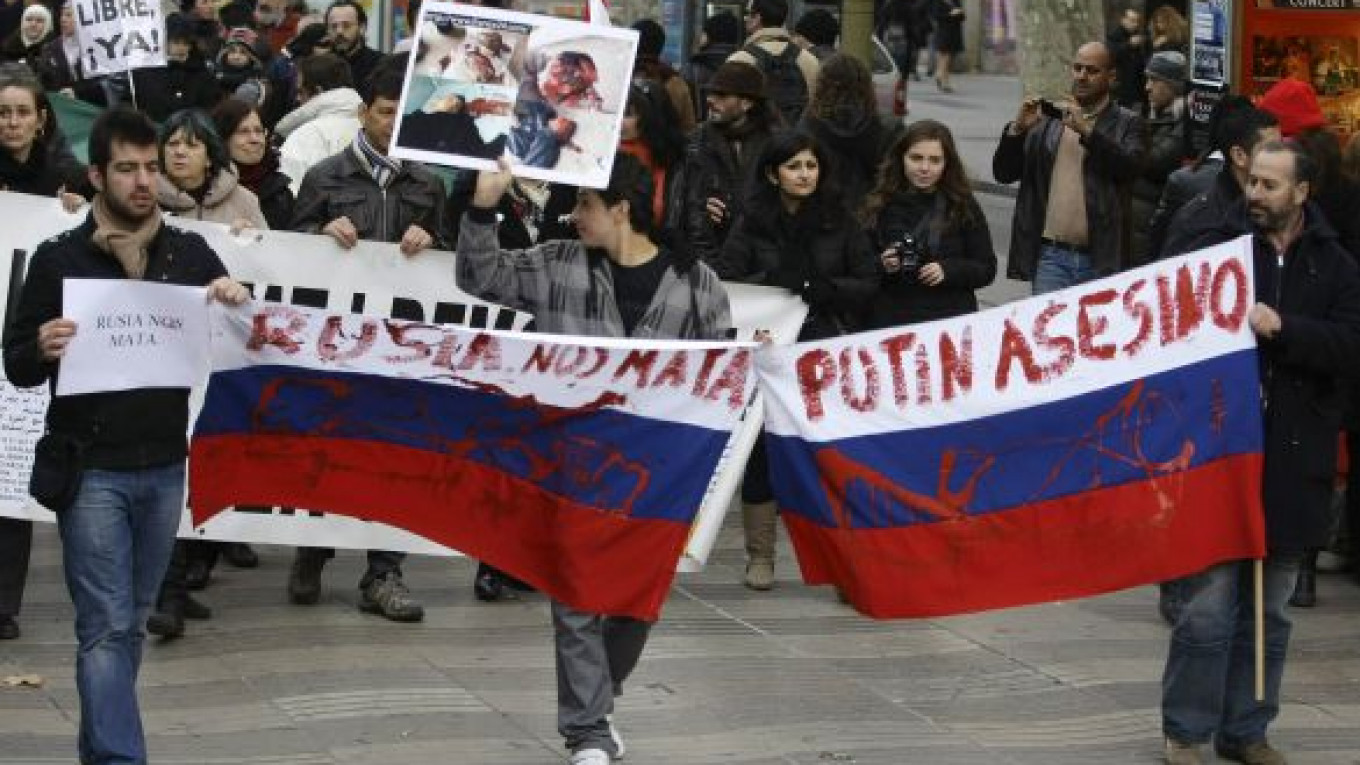Syrian forces bombarded Homs on Saturday in a campaign to crush a revolt against President Bashar Assad, whose ally Russia said it would not support an Arab peace plan circulating at the United Nations.
Activists said seven people were killed in the latest attacks in a weeklong government siege of Homs, which has been at the heart of the uprising that broke out 11 months ago.
The bloodshed followed Friday's violence, when bombings targeting security bases killed at least 28 people in Aleppo and rebel fighters battled troops in a Damascus suburb after dark.
Assad has ignored repeated international appeals, the latest from the European Union, to halt his crackdown.
"I condemn in the strongest terms these acts perpetrated by the Syrian regime against its own civilians," EU foreign policy chief Catherine Ashton said.
However, the world is deeply divided over how to end the conflict. A week ago, Russia and China vetoed a draft Security Council resolution sponsored by Western and Arab states that backed an Arab League call for Assad to step down.
With Syria in worsening turmoil, Saudi Arabia has circulated a new draft for the General Assembly similar to the earlier one.
But Deputy Foreign Minister Gennady Gatilov said Saturday that Russia could not support a move at the General Assembly resting on "the same unbalanced draft resolution text."
Arab Gulf states, the United States, Europe and Turkey hope diplomacy can force Assad out and have ruled out military action of the kind that helped oust Libya's Moammar Gadhafi last year.
The General Assembly is due to discuss Syria on Monday and vote later in the week on the draft resolution, which "fully supports" an Arab League plan floated last month.
Syria is Russia's last remaining ally in the Middle East, and Deputy Foreign Minister Sergei Ryabkov said Friday that his government will thwart any attempts by the West and major Arab powers to oust Assad by using a UN resolution.
"If our foreign partners don't understand that, we will have to use strong means again and again to call them back to reality," he was quoted as saying by Itar-Tass.
On Friday, Russian lawmakers also supported shielding Assad's regime from international sanctions.
The State Duma unanimously passed a statement warning against foreign military intervention in Syria and accusing the West and Arab nations of planning regime change there.
Alexei Pushkov, head of the Duma's Committee on Foreign Affairs, said Russia strongly opposes what he called another military "operation to promote democracy."
Just before the legislative session began, he said: "We are against using humanitarian reasons to change the regime."
The Duma's statement emphasized that the Security Council must not side with the opposition in Syria's internal conflict by demanding that Assad's regime step down.
The Arab League will meet in Cairo on Sunday to discuss the idea of a joint Arab-UN monitoring mission for Syria.
Ayham Kamel, a Eurasia Group analyst, said the previous Russian and Chinese vetoes showed that change in Syria is not imminent. Because rebel forces lack structure and a unified command, Assad will keep the military edge but find it hard to crush the revolt, he said.
"In the next few months, Syria will transition from civil conflict into civil war. Assad's power and control over the country will diminish, and civilian casualties on both sides are expected to rise," Kamel said.
(Reuters, AP)
A Message from The Moscow Times:
Dear readers,
We are facing unprecedented challenges. Russia's Prosecutor General's Office has designated The Moscow Times as an "undesirable" organization, criminalizing our work and putting our staff at risk of prosecution. This follows our earlier unjust labeling as a "foreign agent."
These actions are direct attempts to silence independent journalism in Russia. The authorities claim our work "discredits the decisions of the Russian leadership." We see things differently: we strive to provide accurate, unbiased reporting on Russia.
We, the journalists of The Moscow Times, refuse to be silenced. But to continue our work, we need your help.
Your support, no matter how small, makes a world of difference. If you can, please support us monthly starting from just $2. It's quick to set up, and every contribution makes a significant impact.
By supporting The Moscow Times, you're defending open, independent journalism in the face of repression. Thank you for standing with us.
Remind me later.






